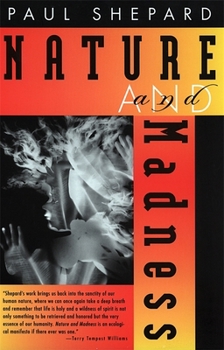Nature and Madness
Select Format
Select Condition 
Book Overview
Through much of history our relationship with the earth has been plagued by ambivalence -- we not only enjoy and appreciate the forces and manifestations of nature, we seek to plunder, alter, and... This description may be from another edition of this product.
Format:Paperback
Language:English
ISBN:0820319805
ISBN13:9780820319803
Release Date:April 1998
Publisher:University of Georgia Press
Length:200 Pages
Weight:0.65 lbs.
Dimensions:0.5" x 6.1" x 9.0"
Customer Reviews
4 ratings
Most important work since Darwin
Published by Thriftbooks.com User , 15 years ago
This is one of several brilliant books that Paul Shepard has written which compels the careful reader to strongly reconsider how that last 10,000 years of cultural and behavioral change have impacted an otherwise healthy human psychological unfolding (ontogeny). For most people, some basic math is a requisite to appreciating the profound insights of this book. Humans in their modern physical form lived as hunters and gatherers in nomadic tribal groups for 190,000 years, then began farming, settling down, and dramatically altering the normal ontogeny just in the last 10,000 years. The last 5% of our history should never be appraised without consideration of the other 95%, something which this author understands. Shepard writing combines a scholarly erudition with a poetic and mythic literary style. This guys rocks!
Nature and Madness
Published by Thriftbooks.com User , 17 years ago
One of the most compelling expositions on the subject in the ecological literature genre, this is a powerful work. Explaining in passionate detail, Shepard observes how the further human culture draws away from the nurturance of the natural world, the more pathological it becomes. If there are any doubts, just look at us! While dense and obscure at times, a careful and patient reading illuminates truths in the clearest light possible. These may not be what we want to hear, but they certainly are what we must learn if we are to thrive with a measure of vibrant health and spirit. Bernie Krause, PhD
Society is Immature
Published by Thriftbooks.com User , 20 years ago
For those interested in studies of western culture's destructive relationship with nature, this treatise from Paul Shepard is certainly a rewarding read, though I recommend it with some reservations. Shepard starts with the Mother Earth concept and takes it to great psychological lengths, then applies this psychology to all of mankind. It's certainly a radical thesis, but it's worth thinking about. In what he calls variously ontogenetic regression, unaltered immaturity, and other labels, Shepard makes the case that humans have been torn from their true mother, the Earth, as the unfortunate outcome of modern civilization and social constructs. Thus, society behaves in pathological ways similar to what can be seen from children who are torn away from their mothers before the onset of maturity. Therefore, our society's attitude toward nature is perpetually immature, underdeveloped, and undernourished, with all the destructiveness and disrespect that results from such a dysfunctional childhood.While this thesis has its various strengths and weaknesses that can be discovered by the reader, there's not enough meat to it to round out an entire book, even a very short one like this. Shepard's most glaring weakness is in psychology, as he offers little more than extremely basic Freud (with the associated sexism and dubious ideas on infancy and childhood), and then makes unconvincing attempts to extend this psychology to society as a whole. Meanwhile, Shepard's writing gets buried in academic dogma that is a real slog for non-professors who don't speak in non-stop technical jargon all day. Watch for arcane terms like methectic, kerygmatic, neoteny, or autochthonous; along with brain-drain sentences like "...amputate and cauterize pubertal epigenesis because they would further transform the relationship of the infant to its mother." Add all this to Shepard's rather self-righteous speculations and you are in for an exasperating read, although the basic thesis of this book definitely offers food for thought.
The disjunction from our past and our modern dilemma
Published by Thriftbooks.com User , 23 years ago
Paul Shepard is the seminal thinker/writer in the field of human ecology. His works have been widely influential and caused some distress amongst environmental groups. This work was originally published by Sierra Club books, but withdrawn in two years because of the controversial ideas. In this, the final volume of a trilogy (The Tender Carnivore and the Sacred Game and Thinking Animals being the first two) he furthers his thesis that seperation from our pleistocene past has caused a modern disjunction with nature and may be the most important cause of modern problems.His indictment of history; "(history) is itself a Western invention whose central theme is the rejection of habitat. It formulates experience outside of nature and tends to reduce place to location.... It seeks causality in the conscious, spiritual, ambitious character of men and memorializes them in writing" (page 47), is one aspect of Shepard's view that modern human culture is pathological.Paul Shepard is not easy to read. His ideas are unsettling and his writing style is dense at times. However, it seems that he is a philosopher who will influence thinking not only about nature and human relationships with nature, but about society and "progress." "Nature and Madness" will upset your view of the world you live in, which is probably the main reason for reading it.




